九年级中考英语动词填空考点归纳(鲁教版)
最新鲁教版九年级英语知识点总结
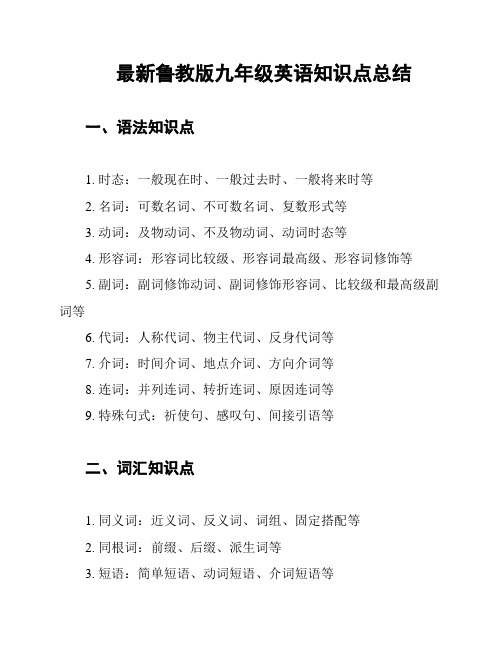
最新鲁教版九年级英语知识点总结
一、语法知识点
1. 时态:一般现在时、一般过去时、一般将来时等
2. 名词:可数名词、不可数名词、复数形式等
3. 动词:及物动词、不及物动词、动词时态等
4. 形容词:形容词比较级、形容词最高级、形容词修饰等
5. 副词:副词修饰动词、副词修饰形容词、比较级和最高级副词等
6. 代词:人称代词、物主代词、反身代词等
7. 介词:时间介词、地点介词、方向介词等
8. 连词:并列连词、转折连词、原因连词等
9. 特殊句式:祈使句、感叹句、间接引语等
二、词汇知识点
1. 同义词:近义词、反义词、词组、固定搭配等
2. 同根词:前缀、后缀、派生词等
3. 短语:简单短语、动词短语、介词短语等
4. 重点词汇:常用高频词汇、词组和短语等
三、听力技巧
1. 听力题型:听句子选图、听对话回答问题、听长对话回答问题等
2. 倾听技巧:注意听关键词、注意听细节、理解对话语境等
3. 记笔记技巧:简化笔记、利用缩写、重点抓取信息等
四、阅读技巧
1. 阅读理解题型:选择题、填空题、判断题等
2. 快速阅读技巧:先读题、预测答案、找关键词等
3. 全面阅读技巧:仔细阅读全文、理解文章主旨、分析文章结构等
五、写作技巧
1. 作文结构:开头、主体、结尾等
2. 作文内容:说明、议论、故事等
3. 写作技巧:使用连接词、丰富词汇、注意语法规范等
以上是最新鲁教版九年级英语知识点总结,希望对您有所帮助。
鲁教版初三知识点综合
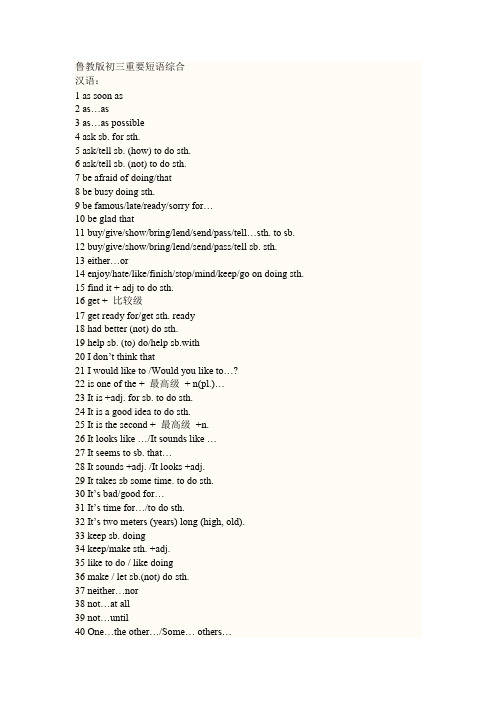
鲁教版初三重要短语综合汉语:1 as soon as2 as…as3 as…as possible4 ask sb. for sth.5 ask/tell sb. (how) to do sth.6 ask/tell sb. (not) to do sth.7 be afraid of doing/that8 be busy doing sth.9 be famous/late/ready/sorry for…10 be glad that11 buy/give/show/bring/lend/send/pass/tell…sth. to sb.12 buy/give/show/bring/lend/send/pass/tell sb. sth.13 either…or14 enjoy/hate/like/finish/stop/mind/keep/go on doing sth.15 find it + adj to do sth.16 get + 比较级17 get ready for/get sth. ready18 had better (not) do sth.19 help sb. (to) do/help sb.with20 I don’t think that21 I would like to /Would you like to…?22 is one of the + 最高级+ n(pl.)…23 It is +adj. for sb. to do sth.24 It is a good idea to do sth.25 It is the second + 最高级+n.26 It looks like …/It sounds like …27 It seems to sb. that…28 It sounds +adj. /It looks +adj.29 It takes sb some time. to do sth.30 It’s bad/good for…31 It’s time for…/to do sth.32 It’s two meters (years) long (high, old).33 keep sb. doing34 keep/make sth. +adj.35 like to do / like doing36 make / let sb.(not) do sth.37 neither…nor38 not…at all39 not…until40 One…the other…/Some… others…41 prefer…to42 see/hear sb. do(doing) sth.43 so…that44 spend…on /(in) doing sth.45 stop to do /stop doing46 such a +adj. +n. that…47 take/bring sth with sb.48 thank sb for sth.49 The more…the better50 There is sth. wrong with…51 too…to52 used to53 What about /How about…?54 What’s the matter with…?55 What’s wrong…?56 Why not…?57 Will (would, could) you please…?英语翻译:1,立刻,一……就……2,和……一样3,尽可能……4,请求某人做某事5,告诉某人做某事6,告诉某人别做某事7,担心……8,忙于做某事9,因……而(famous出名/late迟到/ready准备/sorry抱歉……)10,很高兴去做……11,(buy买/give给/show展示/bring带来/lend借/send发送/pass传递/tell告诉)某事给某人12,意思和11一样13,非此即彼,2者选一的``14,(enjoy喜欢,享受/hate讨厌/like喜欢/finish完成/stop停止/mind介意/keep 保持/go on继续)做某事15,发现做某事很+adj(形容词)16,更……17,准备好做某事18,最好做/别做某事19,帮助某人做某事20,我不认为……21,我想做……/你想做……吗?22,是……其中的一个23,对某人来说做某事怎么样24,这个对做某事是个好主意25,这是第二最……的……(这个我不确定)26,这看起来像……/这个听起来像……27,对某人来说似乎是……28,这看起来像……(+adj)/这个听起来像……(+adj)29,花费某人多少时间去做某事30,对……是好的/坏的31,这是对某人来说做某事的时间了32,这个有2米长/2年之久……33,阻止某人做某事34,保持/使某人+adj35,喜欢做某事36,让某人做某事37,即不……也不38,一点也不……39,没有做……直到……40,1个……,另一个……/一些……,另一些……41,听见/看见某人做某事42,比……更喜欢……43,以便于/以至于……44,花费……在……上(主语为人)45,停下来去做某事/停下来现在做的事46,如此……以至于……47,给某人带来/带去某物48,因……而向某人感谢49,……越多……越好50,……出了点毛病51,太……而不能……52,过去习惯于……53,……怎么样?54,……有什么问题吗?55,……是什么不对吗?(54.55的意思基本相同)56,为什么不……?57,请问你能……?(比如请问你能告诉我哪个是答案吗?是could you please tell me which is the answer? )鲁教版初三下册重要语法一、现在完成时一、基本结构及用法1、现在完成时的构成:主语+助动词have(has)+ 过去分词2、时间状语:already,never,ever,just,yet,since +过去时间点, since +从句,for +段时间…3、意义:(1)表示过去发生或完成的某一动作对现在造成的影响或结果。
九年级英语鲁教版语法知识点归纳

九年级英语鲁教版语法知识点归纳英语作为全球通用的语言,在现代社会中起着重要的作用。
学习英语的过程中,语法是我们必须要掌握的一项基本技能。
它可以帮助我们正确地理解和表达语言,从而更好地进行交流。
下面,我将对九年级英语鲁教版的语法知识点进行归纳和总结。
一、动词时态动词时态是英语中的重要内容之一。
它用来表示动作或状态的发生时间。
在九年级英语鲁教版中,常见的动词时态有一般现在时、一般过去时和一般将来时。
一般现在时用于描述经常发生的动作或客观真理。
例如:She often goes to the library after school.一般过去时常用于叙述过去的事情或状态。
例如:They lived in Beijing last year.一般将来时用于表示将来要发生的动作或事件。
例如:We will have a party next week.二、被动语态被动语态是英语中常用的句子结构之一。
它表示主语是动作的承受者,而不是执行者。
在九年级英语鲁教版中,被动语态的构成为be动词的不同形式加上过去分词。
例如:The book is written by him.(这本书是他写的。
)被动语态在英语中的使用非常广泛,我们需要掌握它的基本用法和常见形式。
三、情态动词情态动词是英语中一类特殊的动词,常用于表示说话人对某种动作或状态的态度、意愿、能力等。
在九年级英语鲁教版中,常见的情态动词有can、could、may、might、shall、should、will、would、must、have to等。
情态动词具有一定的语法特点,例如其后面接动词原形,表示主语的情态动词一般不用于第三人称单数等。
我们需要充分掌握这些规则,并且在实践中灵活运用。
四、非谓语动词非谓语动词是指动词的非谓语形式,包括不定式、动名词和现在分词。
在九年级英语鲁教版中,非谓语动词的用法比较多,常常用来作状语、宾语、定语等。
例如:He likes swimming.(他喜欢游泳。
鲁教版九年级英语1-3单元知识重点梳理

Unit 1 What would you do?一、重点词和短语1. give it to charity 把它给慈善机构2. medical research 医学研究3. watch it grow 看着它上涨增值4. wear a shirt and tie 穿衬衣打领带5. what if 如果……将会怎么样6. get pimples 得了小脓疱7. speak in public 在公共场合说话8. give / make a speech 演讲9. in front of 在……前面in the front of 在……前部10. be in a movie 拍电影11. without permission 未经允许12. introduce sb. to sb. 把某人介绍给某人13. pretty/fairly confident 相当自信14. social situations 社会情况15. bother sb. 打扰某人16. not….in the slightest 根本不,一点也不not…at all 根本不,一点也不17. annoy sb. 使某人生气get/be annoyed at sb. 对某人生气18. plenty of 足够的,很多的19. get along with 与……相处20. be easy to get along with 容易交往/相处21. rather than 胜于A rather thanB A胜于Bwould rather do A than do B 宁愿做A也不愿做B22. English speech contest 英语演讲比赛23. represent the class 代表班级24. come top 名列前茅25. let sb. down 使某人失望26. come up with 针对问题提出想法27. the rest of 剩余的……28. first-aid book 急救书29. have a lot of experience doing sth. 做某事有很多经验30. do with=deal with 处理31. come out 出版,发表32. by accident 偶然地;意外地33. cover sth. with sth. 用某物盖住某物be covered with sth. 被……覆盖34. press sth. hard 用力挤压35. hurry to do sth. 快速做某事36. get the medical help 取得医护帮助37. the burned area 受伤的地方38. (cold) running water (冰)自来水39. offer sb. sth. 提供某人某物40. talk to sb. about sth. 与某人谈论某事41. be dangerous of/doing sth. 做某事危险42. internet friend 网友二、重点、难点、考点及疑点注释1. If I were you, I’d wear a shirt and tie. 如果我是你,我就穿衬衫打领带。
初三鲁教版英语知识点总结unit 2

55. last for long 持续很久 56. regard problems as challenges 视困难为挑战 57. change these problems into challenges 把这些困难变为挑战 58. complain to sb about sth 向某人抱怨某事 59. with the help of our teachers 在我们老师的帮助下 60. compare yourself to other people 把自己与别人对比 61. physical problems 身体问题 62. become very famous and successful 变得很出名,很成功 63. have too much work to do 有太多的工作去做 64. an important part of our development 我们成长中重要的一部分 65. try one’s best to do sth 尽最大的努力做某事
• • • • • • • • • • • • • •
词型转换 1. pronunciationn. pronounce 2. different n. difference adv. differently 3. frustrate frustrating adj (pp.) frustrated 4. quickly adj. quick 5. solution v. solve 6. speak pt. spoke pp. spoken 7. slowly adj. slow 反义词 fast 8. complete adv. completely 9. learner v. learn 10. impress n. impression 11. soft 反义词 hard 12. unfair 反义词 fair 13. easily adj. easy 反义词 difficultly 14. lose pt. lost pp. lost 15. disagreement 反义词 agreement 16. development v. develop 17. unimportant 反义词 important
九年级英语 Unit 2 It must belong to Carla. 鲁教版 知识精讲

九年级英语Unit 2 It must belong to Carla. 鲁教版【本讲教育信息】一、教学内容:Unit 2 It must belong to Carla.(一)重点单词(二)重点短语(三)重点句型(四)语法(五)写作二、知识总结与归纳(一)重点单词1. piic2. possibly3. crucial4. anxious5. owner6. catch7. noise9. escape10. smell11. lift12. ocean13. dishonest14. pretend15. attempt(二)重点短语1. belong to2. make up3. use up4. pretend to do5. be crucial6. be anxious7. less…than…8. much too9. have an appointment with10. escape from(三)重点句型1.It mustbelong to Carla.e.g. He must be in his office now.This must be the dictionary you want.The puter belongs to me.What party does he belong to?2. He was the only little kid at the piic.e.g. She is the only person for the job.He is the only boy in his family.3. She’s the only one who’s studying French.e.g. The book is the only thing that her mother left.I mean the one that was bought yesterday.4. If you have any idea where it might be, please call me.e.g. I have no idea where she is now.Do you have any idea where we will go for our vacation?5. I think Idropped it during the concert so it might still be in the symphony hall.e.g. An apple dropped (down) from the tree.The ball dropped out of his hand.6. I’m really anxious, because I can’t find my backpack.e.g. He is anxious about his daughter’s safety.I am anxious about is health.7. She’s worriedbecause of her test.e.g. Don’t worry. She will catch up with others.He was worried when his daughter didn’t e back at usual time.You don’t have to worry about pay.He can’t go to school because of sickness.The plane arrive late because of the snowstorm.8. He might be late for work.e.g. He was late for the meeting yesterday.I get up late on Sundays.9. They must be making a movie.e.g. At this time, our teacher must be correcting our exam.He could be running for exercise.10. There must be something visiting the homes in our neighborhood…There must be +n./pron. +v.-ing +其他e.g. There must be a child singing in the room.There must be many students visiting the science museum.11. The director of the local zoo says that three monkeys escaped from the Bell Tower.e.g. The villagers were able to escape from the fire.They were lucky to escape being punished.12. You can’t wake a person who is pretending to be asleep.e.g. He didn’t want to go to school, so he pretended illness.He pretended to be dead when he met a bear.She pretended that she was working hard.13. He who would do great things should not attempt them all alone.e.g. The prison attempted an escape but failed.They attempt to go on with the work but couldn’t.Don’t attempt to do so much in such a short time.14. This is not only one of England’s most famous historical places, but also one of its greatest mysteries.e.g. He is not only my teacher but also my friend.Not only the twin sisters but also their little brother has gone to Beijing.15. For a long time, historians believed that Stonehenge was a temple where special priests prayed to ancient earth gods.e.g. I don’t believe he is right.I believe they will win the game, won’t they?He doesn’t think she is telling a lie, does he?(四)语法情态动词must, could / might/may, can’t 表示“推测”的用法must : 一般用于肯定句中,表示较有把握的推测,意为“一定,必然”。
最新鲁教版初中英语九年级上册Unit 3 It must belong to Carla Section A3》初中常用英语动词短语归纳
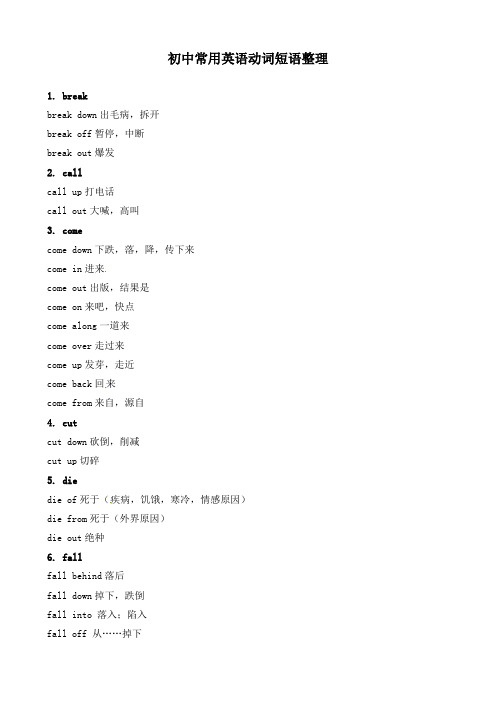
初中常用英语动词短语整理1. breakbreak down出毛病,拆开break off暂停,中断break out爆发2. callcall up打电话call out大喊,高叫3. comecome down下跌,落,降,传下来come in进来come out出版,结果是come on来吧,快点come along一道来come over走过来come up发芽,走近come back回来come from来自,源自4. cutcut down砍倒,削减cut up切碎5. diedie of死于(疾病,饥饿,寒冷,情感原因)die from死于(外界原因)die out绝种6. fallfall behind落后fall down掉下,跌倒fall into 落入;陷入fall off 从……掉下7. gogo along沿着……走go through通过,经受go over复习,检查go up(价格)上涨,建造起来go against违反go away离开go by时间过去go down降低,(日、月)西沉go on (with) 继续进行go out外出,熄灭8. getget down下来,记下,使沮丧get on进展,进步,穿上,上车get off脱下,下车get away逃跑,逃脱get over克服,从疾病中恢复get along with进展,相处get up起床get into (trouble) 陷入困境中get back取回,收回get out 出去get to 到达9. givegive away赠送,泄露,出卖give out发出,疲劳,分发,give in (to sb.) 屈服give up放弃10. handhand in交上,提交hand out分发11. holdhold on to …继续,坚持hold up举起hold on别挂电话,等,坚持12. keepkeep up with跟上keep out 不使……进入keep from克制,阻止keep away from避开,不接近,keep on继续,坚持下来13. knockknock at/on敲knock into撞到某人身上14. looklook up查找,向上看look through翻阅,浏览look after照顾look at看look for 寻找look out (for) 当心look over检查look about / around / round四下查看look forward to盼望look into调查15. makemake up编造,打扮,组成make into / of / from 制成16. passpass by经过pass down (on) … to传给……17. paypay back还钱,报复pay for付钱,为……付出代价18. pickpick up拾起,接人,站起,收听pick out挑选,辨认,看出19. putput up张贴,举起,put out伸出,扑灭put off推迟put into放进,翻译put away放好,存钱put down记下,平息put on穿戴,上映,put aside放到一边put back放回20. runrun after追逐,追捕run away逃跑run off跑掉,迅速离开run out of用完21. setset up建立set off 激起,引起22. taketake after 与…相像take care of照看,照料take off脱掉,起飞take away拿走take up从事,占用(时间、空间)take down记录,取下take back收回take pride in以……为自豪,take the place of 代替take out 取出23. thinkthink of想起,考虑,对……看法think out想出办法think up想出(设计出、发明、编造)thi nk about考虑think over仔细考虑24. turnturn off / on打开turn to翻到,转向,求助turn down调低,拒绝turn b ack返回,转回去turn round转过身来turn up向上翻,出现,音量调大25. carecare about 担心,关心;在乎,介意care for 关心,关怀,照顾26. cleanclean up 把……打扫干净,把……收拾整齐clean out 清除;打扫干净27. learnlearn about 获悉,得知,认识到learn from 从/向……学习28. fightfight f or争取获得fight against 对抗,与……作斗争fight with …与……搏斗/战斗29. dreamdream of梦想,想象dream about 梦到……30. workwork for 为……工作work out 解决,算出,弄懂31. argueargue with …与……争论argue about …争论;议论某事32. complaincomplain to 向……抱怨complain about抱怨……33. hearhear of 听说,听说过hear about听说,得知hear from接到……的信34. talk[来源:学科网]talk about 讨论……talk with/to…和……讨论35. livelive in 住在……live on 以……为食,靠……生活36. standstand out 突显,引人注目stand up 起立,站起来37.其它常用词组wake up 醒,唤醒,弄醒stay up 不睡觉;熬夜depend on依靠;取决于worry about为……担忧laugh at嘲笑……begin with以……开始mix up混合、拌合major in 主修grow up成长open up 打开,开发end up结束,(偶然地)到达throw away 丢弃……ask for要求……wait for等待……agree with同意……find out 发现,找出,查明send out 发出,放出,射出search for 搜索,搜查chop down 砍到have … on 穿着……step out of从…走出drop out of 退学,从……当中退出happen to 发生于……belong to属于arrive in / at到达try on试穿vote on对……进行投票hang out闲逛leave for离开前往sell out 卖完、售完show off 炫耀;卖弄show up 出席;露面。
鲁教版九年级英语全一册知识点总结

鲁教版初三英语全一册(义务教育教科书)Unit 1 When was it invented?Unit 2 Teenagers should be allowed to choose their own clothes.Unit 3 It must belong to Carla.Unit 4 I like music that I can dance to.Unit 5 You\\'re supposed to shake hands.Unit 6 Sad movies make me cry.Unit 7 Life is full of the unexpected.Unit 8 We\\'re going to save the earth!Unit 9 It\\'s important to have good habits.Unit 10 I remember meeting all of you in Grade 6. Unit 11 What\\'s the highest mountain in the world?Unit 12 Could you please tell me where the restooms are?英语语法单词表不规则动词表知识点总结Unit 1语法:虚拟语气 If+一般过去时句子,主语+would +动词原形。
知识点:1 . hundred 百, thousand 千 ,million 百万, billion 十亿前面有确切数字时不加s不加of 如 two hundred前面没有确切数字时加s加of 如 hundreds of2 .worry about …= be worried about…为…担心3. else 修饰疑问词、不定代词、不定副词要后置。
如:what else ,something else4. enjoy oneself 玩的高兴 enjoy doing 喜欢做某事5. help sb. (to)do sth. Help sb. with sth. 帮助某人做某事6. too … to … ,not …enough todo. so…that…7. be afraid to do sth. be afraid ofdoing/n. 害怕做某事8. not …at all =not …in the slightest 一点也不9. plenty of =a lot of 许多…10.would rather do than do , would dorather than do ,prefer to do rather than do.宁愿做…而不愿做…11. be friendly to…对某人友好12. be famous for… 因为…而著名befamous as… 作为…而出名13 .something bad 形容词修饰不定代词要后置14. stop doing 停止做某事stop to do 停下来去做某事15 alone 客观上一个人“独自” live alone 独居 lonely 主观上感到孤独 feel lonely 感到孤独unit21. must “一定”;can’t“ 一定不” “不可能”may/might /could“可能”2.belong to + 名词/代词= be sb’s“属于”3. because + 句子 ;because of +短语4.在附近 in theneighborhood neighbor 指人5. used to do 过去常常做某事get/beused to doing 习惯于做某事beused to do 被用来做某事beused for doing被用来做某事6. happen to sb. 某人发生什么事。
鲁教版四年制初中英语课本短语动词总结(初三和初四)

鲁教版四年制初中英语课本短语动词总结(二)初三上册1.爱上爱上 ________ ________ ___________ _________ 2.去滑冰去滑冰 _________ __________ 3.实现;达到实现;达到 ________ ________ 4.不让...进入进入 ________ _________ 5.打电话给... _______ _________ 6.付款付款 _______ _________ 7.相处;进展相处;进展 __________ ________ 8.出去;离开出去;离开 ________ _________ 9.起飞起飞 ________ __________ 10.逃跑;跑掉逃跑;跑掉 ________ _________ 11.进来进来 _________ _________ 12.发生发生 _________ _________ 13.在...方面做得好方面做得好 ________ _________ __________ 14.克服;恢复克服;恢复 _________ ___________ 15.打开打开 _________ __________ 16.拿走拿走 _________ ________ 17.谋生谋生 ________ ________ ___________ 18. 用完;用尽用完;用尽 __________ __________ ___________ 19.调节(收音机等)使音量变小调节(收音机等)使音量变小 __________ _________ 20.排队等候排队等候 _________ __________ _________ 21.插队插队 _________ ___________ __________ 22.压低声音压低声音 __________ __________ 23.当心;小心当心;小心 __________ ___________ 24.违反规则违反规则 ________ _________ ___________ 25.熄灭熄灭 _________ ___________ 26.捡起捡起 _________ ____________ 27.入睡入睡 ________ _____________ 28.赠送;分发赠送;分发 __________ ___________ 29.听说听说 _________ __________ 30.对...感兴趣感兴趣 _______ _______ __________ ___________ 31.与...交友交友 ________ _________ _________ 初三下册1.睡醒;醒来睡醒;醒来 ________ __________ 2.犯错;出错犯错;出错 _________ __________ 3.嘲笑;取笑嘲笑;取笑 _________ _________ 4.做笔记;做记录做笔记;做记录 ________ ___________ 5.(在词典、参考书等中)查阅;查找(在词典、参考书等中)查阅;查找 ___________ _________ 6.编造;组成;拼凑成编造;组成;拼凑成 _______ ________ 7.处理;应付处理;应付 _________ __________ 8.(指时间)过去;消逝(指时间)过去;消逝 _________ __________ 9.尽力做尽力做 _________ ___________ ___________ 10.突然中止;中断突然中止;中断 _________ ____________ 11.入睡入睡 _________ __________ __________ 12.做决定;下决心做决定;下决心 _________ __________ __________ 13.对...感到自豪感到自豪 _________ __________ __________ 14.对...注意;留心注意;留心 ________ __________ _________ 15.放弃放弃 ___________ ____________ 16.不睡觉;熬夜不睡觉;熬夜 __________ ___________ 17.全神贯注;专心于全神贯注;专心于 ____________ ____________ 18.与...保持距离保持距离 _________ __________ ___________ 19.从容;轻松;不紧张从容;轻松;不紧张 ________ _________ ___________ 20.梦想;幻想;向往梦想;幻想;向往 _________ _________ 21.继续;坚持;保持继续;坚持;保持 _________ ________ __________ 22.(把...)打扫干净;(把...)收拾整齐)收拾整齐 _________ __________ 23.使振奋;使高兴起来使振奋;使高兴起来 ___________ __________ 24.分发;发放分发;发放 _________ ___________ = ___________ ___________ 25.推迟;拖延推迟;拖延 _________ ___________ 26.建立;创立;开办建立;创立;开办 _________ ___________ 27.想出想出 __________ __________ 28.(在外、性格等方面)与(父母等)相像(在外、性格等方面)与(父母等)相像 _________ __________ 29.修理;修补修理;修补 __________ __________ 30.赠送;分发赠送;分发 _________ ___________ 31.张贴;搭建张贴;搭建 _________ ___________ 32.要;要求;请求要;要求;请求 __________ __________ 33.产生结果;发展;成功产生结果;发展;成功 __________ _________ 34.清除;把...打扫干净打扫干净 ___________ _________ 盼望;期待 _________ _________ __________35.盼望;期待初四初四1.使...失望或沮丧失望或沮丧 __________________________- 2.提出;想出(主意、回答等)提出;想出(主意、回答等) ________________________________ 3.形成;组成;构成形成;组成;构成 _________________________ 4.用完;用光用完;用光 ___________________________ 5.减少;削减减少;削减 ______________________________ 6.参加;参与参加;参与 ___________________________________ 7.落入;陷入落入;陷入 __________________________________ 8.与...相撞相撞 __________________________________ 9.穿上盛装;装扮穿上盛装;装扮 ________________________________ 10.交上;提交;呈送交上;提交;呈送 ______________________________ 11.跑掉;迅速离开跑掉;迅速离开 _____________________________ 12.出席;露面出席;露面 ________________________________ 13.激起;引起激起;引起 ________________________________ 14.卖完;售光卖完;售光 _______________________________ 15.顺便拜访顺便拜访 __________________________________ 16.捡起;拾起捡起;拾起 _______________________________ 17.习惯于习惯于 _______________________________________ 18.自学自学 __________________________________ 19.(使)不进入;(使)留在外面(使)留在外面 _________________________ 20.瞄准;针对瞄准;针对 ____________________________ 21.帮助某人解决困难帮助某人解决困难 _________________________ 22.渡过;通过;做完渡过;通过;做完 ________________________ 23.偶遇偶遇 ___________________________ 24.期待;盼望期待;盼望 ___________________________ 。
九年级英语二轮复习:专题复习三 情态动词、动词不定式、动词-ing形式鲁教版知识精讲
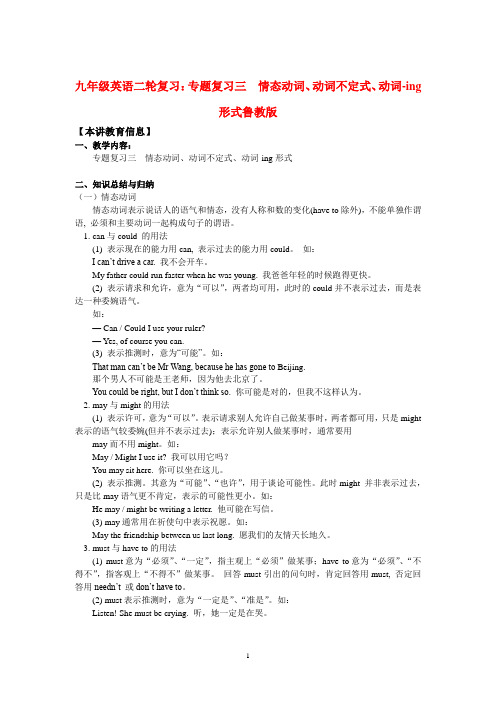
九年级英语二轮复习:专题复习三情态动词、动词不定式、动词-ing形式鲁教版【本讲教育信息】一、教学内容:专题复习三情态动词、动词不定式、动词-ing形式二、知识总结与归纳(一)情态动词情态动词表示说话人的语气和情态,没有人称和数的变化(have to除外),不能单独作谓语, 必须和主要动词一起构成句子的谓语。
1. can与could 的用法(1) 表示现在的能力用can, 表示过去的能力用could。
如:I can’t drive a car. 我不会开车。
My father could run faster when he was young. 我爸爸年轻的时候跑得更快。
(2) 表示请求和允许,意为“可以”,两者均可用,此时的could并不表示过去,而是表达一种委婉语气。
如:— Can / Could I use your ruler?— Yes, of course you can.(3) 表示推测时,意为“可能”。
如:That man can’t be Mr Wang, because he has gone to Beijing.那个男人不可能是王老师,因为他去北京了。
You could be right, but I don’t think so. 你可能是对的,但我不这样认为。
2. may与might的用法(1) 表示许可,意为“可以”。
表示请求别人允许自己做某事时,两者都可用,只是might 表示的语气较委婉(但并不表示过去);表示允许别人做某事时,通常要用may而不用might。
如:May / Might I use it? 我可以用它吗?You may sit here. 你可以坐在这儿。
(2) 表示推测。
其意为“可能”、“也许”,用于谈论可能性。
此时might 并非表示过去,只是比may语气更不肯定,表示的可能性更小。
如:He may / might be writing a letter. 他可能在写信。
九年级动词专项复习(鲁教版)
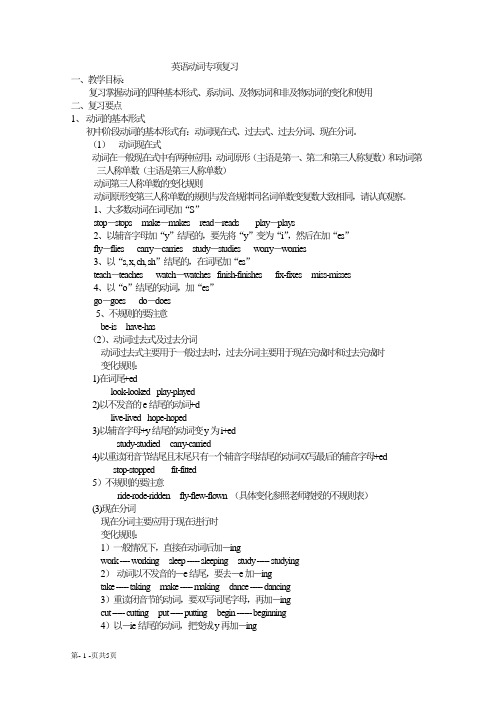
英语动词专项复习一、教学目标:复习掌握动词的四种基本形式、系动词、及物动词和非及物动词的变化和使用二、复习要点1、动词的基本形式初中阶段动词的基本形式有:动词现在式、过去式、过去分词、现在分词。
(1)动词现在式动词在一般现在式中有两种应用:动词原形(主语是第一、第二和第三人称复数)和动词第三人称单数(主语是第三人称单数)动词第三人称单数的变化规则动词原形变第三人称单数的规则与发音规律同名词单数变复数大致相同,请认真观察。
1、大多数动词在词尾加“S”stop-stops make-makes read-reads play-plays2、以辅音字母加“y”结尾的,要先将“y”变为“i”,然后在加“es”fly-flies carry-carries study-studies worry-worries3、以“s, x, ch, sh”结尾的,在词尾加“es”teach-teaches watch-watches finish-finishes fix-fixes miss-misses4、以“o”结尾的动词,加“es”go-goes do-does5、不规则的要注意be-is have-has(2)、动词过去式及过去分词动词过去式主要用于一般过去时,过去分词主要用于现在完成时和过去完成时变化规则:1)在词尾+edlook-looked play-played2)以不发音的e结尾的动词+dlive-lived hope-hoped3)以辅音字母+y结尾的动词变y为i+edstudy-studied carry-carried4)以重读闭音节结尾且末尾只有一个辅音字母结尾的动词双写最后的辅音字母+edstop-stopped fit-fitted5)不规则的要注意ride-rode-ridden fly-flew-flown (具体变化参照老师教授的不规则表)(3)现在分词现在分词主要应用于现在进行时变化规则:1)一般情况下,直接在动词后加-ingwork ---- working sleep ----- sleeping study ----- studying2)动词以不发音的-e结尾,要去-e加-ingtake ----- taking make ----- making dance ----- dancing3)重读闭音节的动词,要双写词尾字母,再加-ingcut ----- cutting put ----- putting begin ------ beginning4)以-ie结尾的动词,把变成y再加-inglie ----- lying tie ----- tying die ----- dying2、及物动词及物动词:及物动词本身意义不完全,需要接宾语才能使其意思完全。
鲁教版九年级上英语各单元必考知识点汇编

鲁教版九年级上英语各单元必考知识点汇编Unit1 必考知识点汇编一、For example, it mentioned that the zipper was invented by Whitcomb Judson in 1893.例如,它提到拉链是惠特科姆•贾德森在1893年发明的。
➢中考链接考查动词时态的用法1、(2012 •怀化中考) The telephone _____ by the well-known scientist, Edison.A. inventedB. inventingC. was invented二、In England, tea didn’t appear until around 1660, but in less than 100 years, it had become the national drink.在英国,茶直到大约1660年才出现,但是不到100年,它变成了全民性的饮料。
➢中考链接考查连词的用法2、(2013 •南宁中考) I will wait ______ I hear from you.A. untilB. sinceC. whileD. because三、At the same time, they need to stop the competing team from getting the ball into their own basket.同时,他们需要阻止竞赛队把球投进他们自己的篮筐。
➢中考链接考查动词stop的用法3、(2013 •孝感中考)—Dad, why must I stop _______ computer games?—For your health, my boy.A. playB. to playC. to playingD. playing四、These stars encourage young people to work hard to achieve their dreams.这些明星鼓励年轻人努力工作来实现他们的梦想。
定稿 鲁教版 九年级全册英语动词用法小结

动词填空小节:一.九个时态主动语态的九个时态:1.一般现在时的谓语构成1. be(am,is,are)动词,2.行为动词(原形和三单)一般现在时的标志:every day(每天), in the morning等2.现在进行时谓语构成:be(am,is,are)+doing现在进行时标志:look,listen,now3.一般过去时谓语构成:1)be动词的过去时:were/was 2)行为动词的过去时标志:ten years ago,yesterday,last year4.过去进行时谓成:were(was)+doing 标志:the whole morning,from nine to ten last evening, when, while,at that time , at nine o'clock yesterday5. 一般将来时谓语构成:1.will+v.(常用形式)2.be going to+v.3.be +doing 现在进行时表将来标志:next day,next year,tomorrow,in the future6. 过去将来时:谓语构成: would+v.标志:宾语从句中7.现在完成时用法1.过影响现谓语构成:have/has+v.过分标志:already,never,ever,just,before,yet用法2.过延到现谓语构成:have/has+v.过分(延续性)标志:一段时间(for+一段时间、since+时间点、since+一般过去时的句子,so far,up to now,for the last5years,ever since then,till now,rencently,in his life,lately)注意事项:1).非延续性动词的否定结构中可用于现在完成时的用法二例如:She haven’t left here for ten years.2).两去一在:have been to 去过(次数)have gone to 去了have been in 待在(一段时间)*8.现在完成进行时谓成:have/has+been+doing标志:一段时间(与现在完成时用法二标志同)9.过去完成时谓成: had+v.过去分词标志:by the time/when/before+一般过去时的句子等二.三个被动语态:1.一般现在时的被动语态谓语构成:be(am/is/are)+及物V.过去分词2.一般过去时的被动语态谓语构成:be(was/were)+及物V.过去分词3.含情态动词的的被动语态谓语构成:情态动词+be+及物V.过去分词以下五大类:一.?+doing sth.allow doing sth. 允许干某事advise doing sth. 建议干某事appreciate doing sth(感激)avoid doing sth避免干某事以下黑体是介词结尾的短语后跟doinga time for doing sth. 一个用来干某事的时间be good at doing sth.(擅长干某事)be interested in doing sth.对干某事感兴趣become interested in doing变得对某事感兴趣be afraid of doing sth. 害怕干某事be halfway to doing sth.干完某事的一半because of doing sth. 因为干某事by doing sth. 通过干某事be sure about doing sth. 对干某事有把握be against doing sth.反对干某事be for doing sth.支持干某事be used to doing 习惯于干某事(主语是人)be used for doing sth.= be used to do sth被用来干某事(主语是物)be always doing sth. 总是干某事be busy doing 忙于干某事be comfortable doing sth (自如地)be worth doing sth 值得干某事can’t help doing sth 忍不住干某事can’t stand doing sth.不能忍受干某事can’t stop/help doing sth忍不住干某事complete doing sth完成干某事complain about doing sth 抱怨干某事consider doing sth考虑干某事do some +doing 干某事do some reading/ do some shoppingdream of/about doing sth (梦想)end up doing sth 最终干某事enjoy (喜欢) doing sth.educate sb. about doing sth (教育某人干某事)finish doing sth. 完成干某事feel like doing sth.想要(感觉像)干某事give up doing sth. 放弃干某事go+doing去干某事go fishing /go swimming / go shoppinghow about doing sth. 干某事怎么样have fun doing sth. 愉快地干某事have a good/great time doing sth. 愉快地干某事have a hard/difficult time doing sth. 干某事有困难have problems doing sth. 干某事有困难have trouble doing sth. 干某事有困难have difficulty doing sth. 干某事有困难have experience (in)doing sth 干某事有经验imagine doing sth. 想象干某事imagine sb. doing sth. 想象某人干某事instead of doing sth 代替干某事keep doing sth. 保持干某事keep on doing sth. 继续干某事keep sb from doing sth 阻止某人干某事look forward to doing 盼望干某事mind doing sth. 介意干某事mind sb’s/sb doing sth. 介意某人干某事pay attention to doing sth注意干某事practice(练习) doing sth.play a role in doing sth.在干某事中发挥作用play a part in doing sth. 参与干某事put off doing sth. 推迟干某事protect sb. from doing sth. 保护某人不干某事prefer doing sth. to doing sth. 更喜欢干某事胜过干某事prevent sb (from) doing sth阻止某人干某事stop sb. (from) doing sth.阻止某人干某事Sb. spend (花费) ...doing sth.such as doing sth. 例如干某事succeed in doing sth. 成功干某事suggest doing sth. 建议干某事take up doing sth. 开始(学着)干某事think about/of doing sth(考虑)There be sb./sth. doing sth.有某人或某物正在干某事thanks for doing sth. (感谢干某事)waste some time doing sth浪费一段时间干某事without doing sth. 不干某事What about doing sth. =How about doing sth. 干某事怎么样————————————————————————————————————————————二、?+do (动词原形) 或?+sb. + do sth.情态动词can/could/must/may/might/will/would/shall/should +do sth能/能/必须/可以/可能/将/将/将/应该类情态动词have to, be able to, be supposed/expected to, be going to +do sth不得不/能/应该/将be due to+ do sth. 预定干某事Will ( Would/Could ) you please do sth. 请你干某事好吗Will ( Would/Could ) you please not do sth. 请你不干某事好吗do/does/did + V.原形had better do sth. 最好干某事have nothing to do but do sth. 除了干某事无事可做please出现用动词原形,祈使句以动词原形开头prefer to do sth. rather than do sth.更喜欢干某事胜过干某事Why not do sth. =Why don’t you do sth. 为什么不干某事let sb. do sth. 让某人干某事make(使)sb. do sthhelp sb. do sth. 帮助某人干某事发现一感二听三让四看五半帮助+sb. do sth.find/feel/hear/listen to/make/let/have/see/watch/notice/look at /help+sb. do sth.发现/感觉/听见/听/使/让/使/看见/注视/注意到/看/帮助+某人干了某事三.?+to do sth. 或?+sb. + to do sth.allow sb. to do sth. 允许某人干某事ask (让)sb. to do sth. / ask (让)sb. not to do sth.argee to do sth. 同意干某事advise sb. to do sth. 建议某人干某事afford to do sth (负担得起干某事)a way to do sth.干某事的方法a good way to study English学英语的好方法a time to do sth.干某事的时间a good time to give thanksa place to do sth.干某事的地方a good place to have funbe +形+ to do sth.be happy/glad to do sth. 高兴地干某事be afraid to do sth. 害怕干某事be ready to do sth. 准备干某事be careful to do sth. 当心干某事be sorry to do sth (后悔干某事)be surprised to do sth (吃惊得干某事)be suitable to do sth (适合干某事)be sure to do sth (一定干某事)be willing to do sth(乐意干某事)be up to sb. to do sth. 由某人决定干某事be made to do sth (被使得干某事)be allowed to do sth (被允许干某事)be used to do sth被用来干某事(主语是物)be about to do sth. 正要做某事can’t wait to do sth迫不及待干某事decide (决定)to do sth.= make a decision to do sth encourage sb. to do.鼓励某人干某事expect(期待) to do sth.expect(期待) sb. to do sth.…enough to do sth. 足够…而能干某事find it +形+to do sth.发现干某事...fear to do sth (害怕干某事)fail to do sth. 未能干某事get to do sth (有机会干某事)hope to do sth. 希望干某事help sb. to do sth(帮助某人干某事)have time to do sth. 有时间干某事have an opportunity to do sth= have a chance to do sth(有机会干某事)in order to do sth. 为了干某事invite (邀请) sb. to do sth.It is +形+(for sb.)to do sth. 干某事对某人来说是……It takes sb. some time to do sth. 花费某人一段时间干某事It’s time to do sth. 干某事的时间到了It’s best to do sth. 最好干某事learn(学习) to do sth.lead sb. to do sth(引导某人干某事)live to be +年龄活到manage to do sth. 设法做某事need (需要) to do sth.need sb. to do sth。
鲁教版英语九年级各单元重难点总结详细

鲁教版英语九年级各单元重难点总结详细1 / 26初四英语Unit 1 What would you do ?重点短语 1. What if2. pretend to do sth.3. be late for4. a few 与 a little ,few 与 little5. still6. hundred, thousand , million, billion7. what if + 从句8 . add sth. to sth. 9. 系动词与形容词连用 10. too +形/副+to do sth. 11. help with sth 12. in public 13. energetic, energy 14. ask sb. to do 与ask sb. not to do sth. 15. start doing =start to do.16. borrow sth. from sb. 17.wait for sb 18. introduce sb. to sb. 19. invite sb. to do 20. have dinner/ supper have breakfast/ lunch/dinner 21 . plenty of + 可数名词/不可数名词 22.give sth. to sb.= give sb. sth.23. get along with sb. 24. would rather do sth. than do sth. 25. whole 26. in fact 27. let sb. down 28. come up with sth.与 catch up with sb. 29. have experience doing30. come out 31. by accident 32. hurry to do33. more than 34. offer sb. sth.重点句型1. What would you do if you won a million dollars? 假如你赢了一百万美元,你将用它做什么? 动词win 和beat 都可以表示“赢,胜”,其区别是:前者后接比赛、奖品、名声、2. If I were you, I ’d wear a shirt and tie. 如果我是你,我就穿衬衫戴领带。
九年级英语 Unit 12 I remember meeting all of you in Grade 6知识总结与归纳 鲁教版
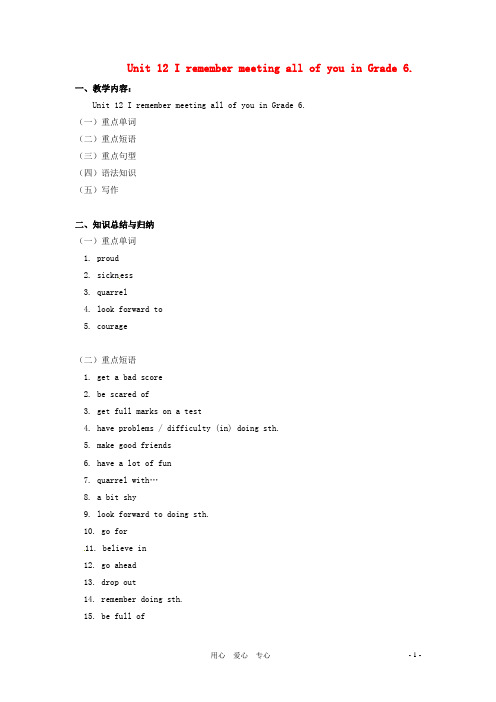
Unit 12 I remember meeting all of you in Grade 6.一、教学内容:Unit 12 I remember meeting all of you in Grade 6.(一)重点单词(二)重点短语(三)重点句型(四)语法知识(五)写作二、知识总结与归纳(一)重点单词1. proud2. sickn ess3. quarrel4. look forward to5. courage(二)重点短语1. get a bad score2. be scared of3. get full marks on a test4. have problems / difficulty (in) doing sth.5. make good friends6. have a lot of fun7. quarrel with…8. a bit shy9. look forward to doing sth.10. go for11. believe in12. go ahead13. drop out14. remember doing sth.15. be full of(三)重点句型1. I remember meeting all of you in Grade 6.2. He used to be scared of a teacher.3. Peter has enjoyed every year of junior high school.4. Someone was encouraged by a teacher.5. My time at junior high school has been mostly good.6. Now I know that I have the ability to do good work.7. I hope to pass the entrance examination.8. …they are telling you that they plan to do their best to achieve their aim.9. Grade 9 is celebrating their graduation tomorrow.(四)语法知识:动词后跟to与doing的异同区别这些词的用法1. remember to doremember doing【翻译】离开时记着锁门。
鲁教版英语(五四制)九年级_Unit1_核心常考词汇详解
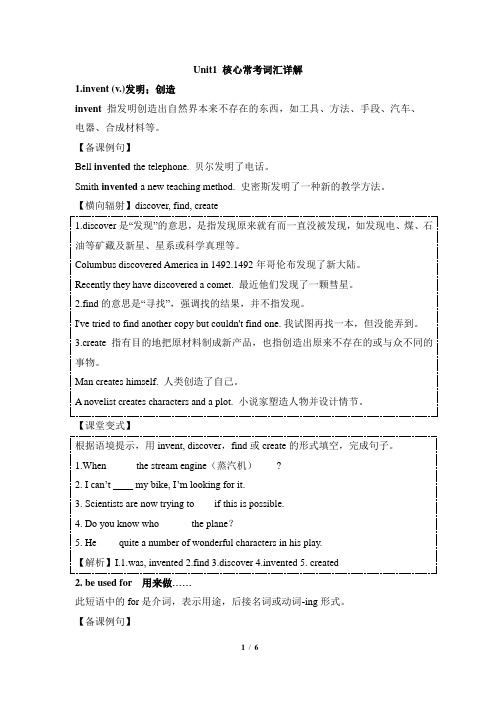
Unit1 核心常考词汇详解1.invent (v.)发明;创造invent指发明创造出自然界本来不存在的东西,如工具、方法、手段、汽车、电器、合成材料等。
【备课例句】Bell invented the telephone. 贝尔发明了电话。
Smith invented a new teaching method. 史密斯发明了一种新的教学方法。
【横向辐射】discover, find, create1.discover是“发现”的意思,是指发现原来就有而一直没被发现,如发现电、煤、石油等矿藏及新星、星系或科学真理等。
Columbus discovered America in 1492.1492年哥伦布发现了新大陆。
Recently they have discovered a comet. 最近他们发现了一颗彗星。
2.find的意思是“寻找”,强调找的结果,并不指发现。
I've tried to find another copy but couldn't find one. 我试图再找一本,但没能弄到。
3.create指有目的地把原材料制成新产品,也指创造出原来不存在的或与众不同的事物。
Man creates himself. 人类创造了自己。
A novelist creates characters and a plot. 小说家塑造人物并设计情节。
【课堂变式】根据语境提示,用invent, discover,find或create的形式填空,完成句子。
1.When _____ the stream engine(蒸汽机)___?2. I can’t ____ my bike, I’m looking for it.3. Scientists are now trying to ___ if this is possible.4. Do you know who______ the plane?5. He ____quite a number of wonderful characters in his play.【解析】I.1.was, invented 2.find 3.discover 4.invented 5. created2. be used for 用来做……此短语中的for是介词,表示用途,后接名词或动词-ing形式。
九年级英语全册各单元话题及语法要点鲁教版

各单元话题及主要语法六上Unit 1 Good morning! (26个字母、招呼语)Unit2 What’s this in English?(指认物品、拼写单词)Unit3 What color is it?(辨认物品颜色)Unit4 My name’s Gina.(介绍自己、问候他人、询问和告知电话号码)Unit5 This is my sister.(介绍他人、辨认人物)Unit6 Is this your pencil?(确认物主关系)Unit7 Where’s my schoolbag? (谈论物品的位置)Unit8 Do you have a soccer ball? (谈论物品的所属关系)Unit9 Do you like bananas? (谈论好恶)Unit10 How much are these socks? (谈论衣物、询问价格、提供帮助、感谢他人)语法重点:1.am\ is\ are引导的一般疑问句:2助动词do/does的用法;实意动词原形变三单及用法3 what\ what color \ where\ how much引导的特殊疑问句4 名词单复数及名词的所有格5 人称代词、物主代词分类及用法六下Unit 1 When is your birthday?(谈论日期、月份名称)Unit 2 My favorite subject is science. (谈论课程的喜好并给出理由)Unit 3 Can you play the guitar? (谈论乐器、运动等方面的能力)Unit 4 What time do you go to school? (日常活动的时间)Unit 5 How do you get to school? (谈论出行方式)Unit 6 Don’t eat in class. (谈论家规与校规)Unit 7 Why do you like pandas? (谈论对动物的好恶并给出理由)Unit 8 I’m watching TV. (谈论正在进行的事情)Unit 9 It’s raining! (谈论天气)Unit10 Is there a post office near here? (关于方位的问与答、某处存在某物)语法重点:1 现在进行时、基数词与序数词2 祈使句、情态动词can的用法3 there be 句型4 when/ why/ how/ what time引导的特殊疑问句七上Unit1 What does he look like? (从体型、身高、发型等方面描写人物外貌)Unit 2 I’d like some noodles. (餐馆点餐用语及食物名称)Unit3How was your school trip? (谈论过去的某次旅行)Unit 4 What did you do last weekend? (谈论上周的周末活动)Unit5 Where did you go on vacation? (谈论过去的某次度假)Unit 6 How often do you exercise? (谈论人物做某事的频率)Unit 7 I’m more outgoing than my sister. (谈论相比较之下的人物性格特点)Unit8 What’s the best movie theater? (谈论喜好)语法重点:1would like的用法及区分名词的可数、不可数2 一般过去时、不规则动词的过去式变化3形容词、副词的比较级与最高级4 表频率的副词七下Unit1 Do you want to watch a game show? (谈论各类电视节目的喜好)Unit2 I’m going to study computer science. (谈论对学习、工作计划和打算)Unit3 Will people have robots? (将来要发生的事情)Unit4 How do you make a banana milk shake? (描述做某事的过程)Unit5 Can you come to my party? (发出、接受和拒绝邀请及义务、职责)Unit6 If you go to the party, you’ll have a great time! (谈论做某事的条件及结果)Unit7 What’s the matter? (谈论疾病、健康问题并给出建议)Unit8 I’ll help to clean up the city parks. (参与社区活动,提供帮助)语法重点:1一般将来时及两种表达2 表先后副词3 if引导的条件状语从句:主将从现4 提建议各种表达八上Unit1 Could you please clean your room? (礼貌地提出请求和征寻许可)Unit2 Why don’t you talk to your parents? (谈论生活、学习中遇到的难题并给出解决建议)Unit3 What were you doing when the rainstorm came? (讲诉过去某一时刻正在发生的事情)Unit 4 An old man tried to move the mountains. (学习用各种时态讲故事)Unit5 What’s the highest mountain in the world? (学习“之最”的表达)Unit 6 Have you read Treasure Island yet? (谈论过去已经发生过的事情,强调对现存的影响)Unit7 Have you ever been to a museum? (谈论过去游览过的地方)Unit8 I’ve had this bike for three years. (谈论某种状态持续了多久)语法重点:1现在完成时(第6、7、8单元)2 形容词、副词的比较级与最高级及其注意事项(第5单元)3过去进行时:当一个动作发生时另一个动作正在进行(第3单元)4 提建议的方法(第2单元)5 Could的用法:委婉地表达请求和征寻许可(第1单元)八下Unit1 When was he born?(谈论我们所崇拜的名人)Unit 2 It’s a nice day, isn’t it?(谈论与陌生人的闲聊)Unit3 Where would you like to visit?(谈论假期里想去游览的地方)Unit4 How can we become good learners?(谈论有效的学习方法)Unit5 I think that mooncakes are delicious!(谈论各种节日并给出个人看法)Unit6 Could you please tell me where the restrooms are?(礼貌地询问处所方位信息并指路)Unit7 I used to be afraid of the dark.(谈论今夕对比)Unit8 What are the shirts made of?(谈论产品的原材料与产地)语法重点:1 反意疑问句(第2 单元)2做某事的方式:by doing sth (第 4 单元)3 陈述句、一般疑问句作宾语从句,感叹句(第 5 单元)4 特殊疑问句作宾语从句,用could 表示委婉语气(第 6 单元)5 used to do sth: 过去常常做某事(第7 单元)6 被动语态(第 8 单元)九年级全册Unit1 When was it invented? (谈论物品发明的历史)Unit2 Teenagers should be allowed to choose their own clothes. (谈论被允许、赞同或不赞同做某事)Unit3 It must belong to Carla. (学习做出判断的表达)Unit4 I like music that I can dance to. (表达对各类物品的喜好)Unit5 You’re supposed to shake hands. (谈论各国及应该做的事情)Unit6 Sad movies make me cry. (谈论事件对人物的影响)Unit7 Life is full of the unexpected. (讲诉发生在过去的两件事的先后关系)Unit8 We’re trying to save the earth. (污染与环境保护问题)Unit9 It’s important to have good habits. (对比习惯与行为)Unit10 I remember meeting all of you in Grade 6. (回味过去展望未来)语法重点:1一般过去时的被动语态2含情态动词的被动语态3 使用恰当的情态动词表示判断4定语从句5 be supposed to do sth:被期望做某事6 宾语补足语7 过去完成时8 疑问句作宾语从句。
九年级备考动词填空的经典答题方法(鲁教版)

备考动词填空的经典答题方法一、锁定时间状语法每一种动词的时态都有其固定的时间状语。
根据时间状语一般能判断出动词的时态。
如:一般现在时常与usually, often, sometimes, always, every day等表示现在的时间状语连用;一般过去时常与yesterday, the day before yesterday, last week, just now, a week ago, once, long before, the other day等表示过去的时间状语连用;一般将来时常与tomorrow, next we ek, this month, in a week, soon, the day after tomorrow等表示将来的时间状语连用;现在进行时常与now, this week, these days等表示现在的时间状语连用;过去进行时常与this ti me yesterday, at two yesterday afternoon, at that time, last night, those days等表示过去的时间状语连用;现在完成时常与already, yet, just, ever, never等副词和“for + 时间段”或“since + 时间点”连用;过去完成时常与by the end of last term (month…), before that d ay, by then, last night, 或与由when, before, after, as soon as, until, by the time等引导的表示过去的时间状语从句连用。
二、锁定句子意境法对于没有时间状语的句子,要根据句子所表示的意境来确定时态。
或者根据前后句或主从句的语境和关系来确定动词的时态。
如:look, listen等动词作状语使用时,句子要用现在进行时;在宾语从句中,主句为一般过去时,从句也要用某种过去时态;在条件状语从句中,从句用一般现在时,主句就要用一般将来时等。
鲁教版初中英语初三英语四个时态提纲

初三英语时态复习提纲一般现在时1.概念:经常、反复发生的动作或行为某种状况。
2.时间状语:always, usually, often, sometimes, every week (day,year,month…), once a week, on Sundays,3.基本结构:动词原形或者是第三人称单数(如主语为第三人称单数,动词上要改为第三人称单数形式)4.否定形式:1)有be动词的为am/is/are+not;We are students. 改为We aren’t students2)此时态的谓语动词若为行为动词,则在其前加don't,People usually go to work. 改为People don’t usually go to work.3)如主语为第三人称单数,则用doesn't,同时还原行为动词。
She likes to eat fruit. 改为She doesn’t like t o eat fruit.4)有情态动词的在情态动词后加上notThe doctor can help you. 改为The doctor can’t help you.5.一般疑问句:1)有be的把be动词放于句首;He is always at home.. 改为Is he always at home.?肯定回答:Yes, he is. 否定回答:No, he isn’t.2)句子中有动词原形的用助动词do提问,We sometimes watch TV. 改为Do you sometimes watch TV?肯定回答:Yes, we do. 否定回答:No, we don’tt.3)动词为第三人称单数,则用does,同时,还原行为动词。
The girl speaks English everyday. 改为Does the girl speak English everyday肯定回答:Yes, she does. 否定回答:No, she doesn’t.4)有情态动词的把情态动词提到句首I can swim. 改为Can you swim?肯定回答:Yes, I can. 否定回答:No, I can’t.6. 一般现在时在句中的意义:(1)表示经常性的动作或状态表示经常性动作或状态时,常与often,always,usually,sometimes,every day等时间状语连用。
- 1、下载文档前请自行甄别文档内容的完整性,平台不提供额外的编辑、内容补充、找答案等附加服务。
- 2、"仅部分预览"的文档,不可在线预览部分如存在完整性等问题,可反馈申请退款(可完整预览的文档不适用该条件!)。
- 3、如文档侵犯您的权益,请联系客服反馈,我们会尽快为您处理(人工客服工作时间:9:00-18:30)。
中考英语动词填空考点归纳
一、考查谓语动词的时态
就近年来的中考题而言,常考的动词的时态有:一般现在时、一般将来时、一般过去时、现在进行时、过去进行时、现在完成时、过去完成时等。
如:
1. 一般现在时
My father is very busy. He ________(go) to work early every morning.
【答案】goes
2. 一般将来时
—What’s your plan for the coming holiday?
—I ________(visit ) Beijing if possible.
【答案】will / am going to visit
3. 一般过去时
Jack ________(begin) to write a book about his journey two weeks ago.
【答案】began
4. 现在进行时
—Where is Jim now?
—He ________(water) some flowers in the garden.
【答案】is watering
5. 过去进行时
They ________(talk) about the TV play when I came into the room yesterday.
【答案】were talking
6. 现在完成时
Mr Chen ________(teach) English in our school for ten years.
【答案】has taught
7. 过去完成时
Mike told me that he ________(be) to New York twice.
【答案】had been
二、考查谓语动词的语态
就近年的中考题而言,常考的动词的语态有:一般现在时的被动语态、一般将来时的被动语态、一般过去时的被动语态等。
如:
1. 一般现在时的被动语态
Paper________(make) from wood.
【答案】is made
2. 一般将来时的被动语态
What do you think ________(talk) about at the meeting tomorrow?
【答案】will be talked
3. 一般过去时的被动语态
How many fridges ________(produce) in China last year?
【答案】were produced
三、考查非谓语动词
主要考查动词不定式和动词的-ing形式在句子中充当宾语和宾语补足语,以及其他搭配及常见用法。
如:
1.Doctors often tell us ________(drink) more water every day.
【答案】to drink
2.When I walked past his house, I heard him ________(play) the piano.
【答案】playing
3.The heavy snow stopped them from ________(leave) the hotel.
【答案】leaving。
